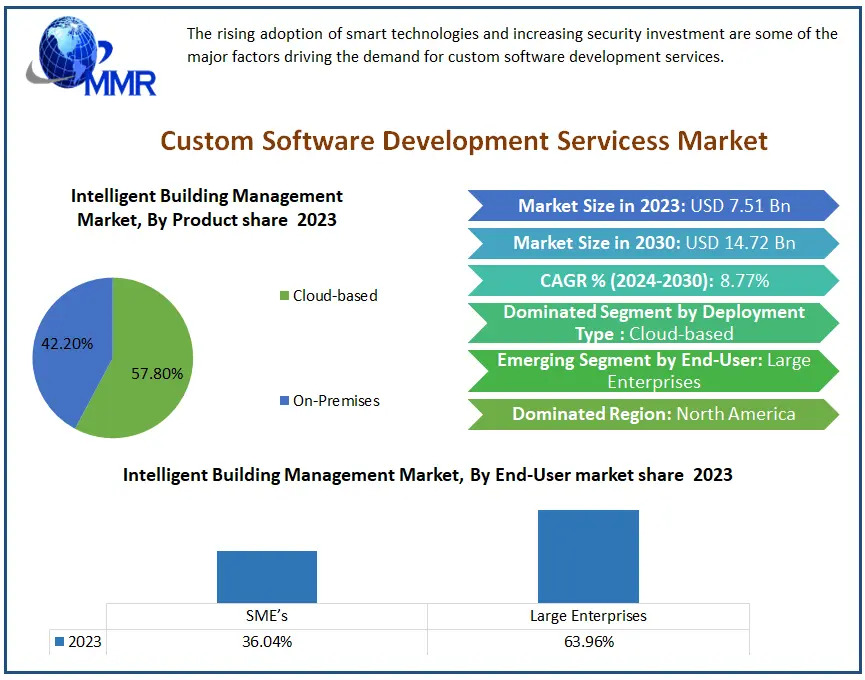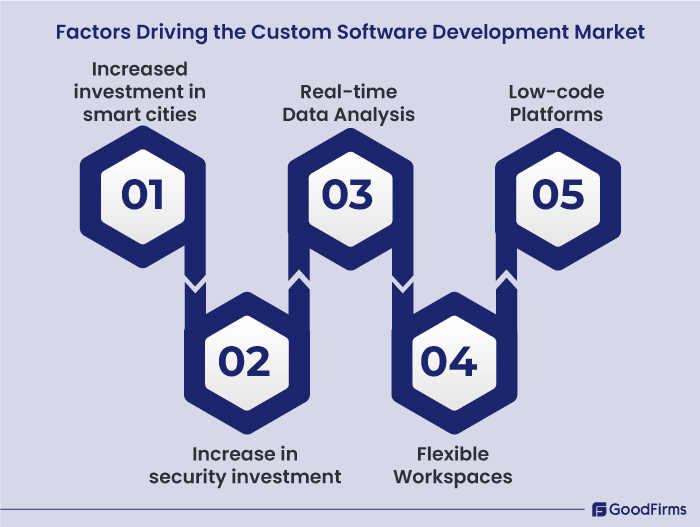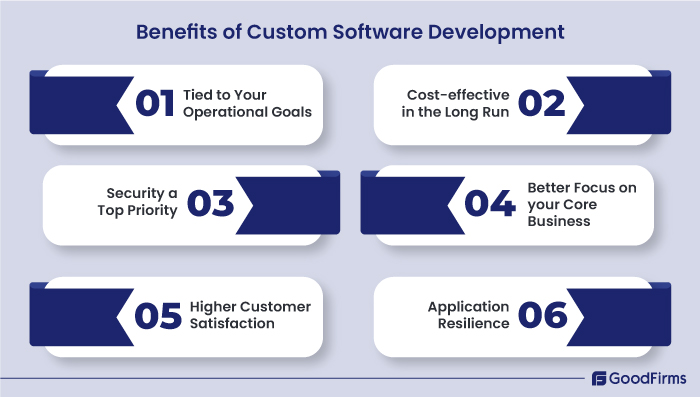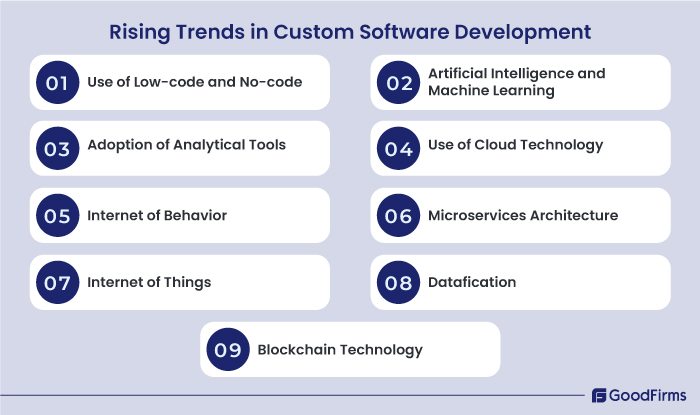As the world becomes digital, businesses increasingly recognize that generic solutions won’t cut it.
Why? Because these generic solutions are freely available in the marketplace and can be owned by anyone, this won’t give businesses the edge they desperately seek.
This is where custom software solutions come in. Not surprisingly, 89% of businesses have invested in tailored solutions over generic ones. By 2026, the custom software development market is expected to reach $26.74 billion, underlining the growing demand for customized software development solutions over off-the-shelf solutions.
Businesses looking for custom software solutions should hire a trusted custom software development company. These custom software development companies are focused on offering top-level services that align with your short—and long-term business goals.
So, basically, what is custom software development, which is drawing the attention of all kinds of businesses—small, medium, and large—despite being bad-mouthed as a costly proposition? Let’s find out.
What is Custom Software Development
Custom software development focuses purely on business requirements, meaning the software developers craft apps that work in alignment with your goals. Moreover, issues are immediately addressed, unnecessary features and complexities are eliminated, and businesses are provided with only those features that help them succeed.
Custom Software Development Versus Off-the-Shelf Solutions
Custom software development involves designing applications to meet a company's unique requirements. In contrast, off-the-shelf software is a readily available solution developed for the general market and won't suit a company's specific requirements.
While custom software can easily be scaled, it typically comes with a higher initial cost and longer development time than off-the-shelf options.
|
Feature |
Custom Software |
Off-the-Shelf Software |
|
Customization |
Custom software is designed to meet unique business needs. |
Off-the-shelf solutions are designed for a general audience and may not cater to specific business needs. |
|
Cost |
Custom software requires a significant upfront investment. |
Off-the-shelf solutions are generally cheaper upfront. |
|
Scalability |
Custom software can be scaled as your business grows. |
Off-the-shelf solutions offer limited scalability. |
|
Development Time |
Custom software development can be tedious and time-consuming. |
Off-the-shelf solutions are available for immediate use. |
|
Competitive Advantage |
With custom software development, unique features and functionalities can be added to the app, giving the app an edge over the competition. |
Off-the-shelf solutions have general features and are available to the entire marketplace. |
|
Maintenance |
Ongoing maintenance is required for custom software. |
Maintenance is managed by the provider |
|
Integration |
Designed to integrate with existing workflow seamlessly |
It may not integrate with existing workflow, leading to compatibility issues. |
How Much Does Custom Software Development Cost
According to Goodfirms' Custom Software Development Cost Survey, costs primarily depend on the size and scope of the project. Projects can be small, mid-range, or large. Each size comes with its timeline, price, and set of features.
Knowing the difference will help you choose the right software for your project.
| Project Size | Average Cost | Key Insights |
| Small | Under $30,000 | Suitable for MVPs and early-stage startups; minimal upkeep |
| Mid-range | $30,000 - $1,00,000 | Growing businesses, higher functionality, moderate maintenance |
| Large-scale | $1,00,000 -$2,00,000 | Enterprise-grade apps, automation tools, or data-integrated systems |
Factors Driving the Custom Software Development Market
The custom software development market was valued at $7.51 billion in 2023 and is expected to grow at a CAGR of 8.77% from 2024 to 2030, reaching an impressive $14.72 billion by 2030.
A few key factors driving the custom software market's growth:

- Increased investment in smart cities: As smart cities use a range of software for smooth operations, software demand is expected to increase.
- Increase in security investment: Custom software development mitigates technological and security vulnerabilities and other technical challenges, ensuring consistent performance.
- Real-time Data Analysis: These applications offer actionable insights that help businesses tweak their marketing strategies and thrive in an overcrowded marketplace.
- Flexible Workspaces: Remote and hybrid work models have led businesses to harness the power of custom solutions as these tools are known to propel productivity and collaboration.
- Low-code Platforms: Low-code platforms help organizations develop and deploy software quickly and cost-effectively.

Among many other factors, these are the few key factors propelling custom software development's growth and making it a must-have tool for all business sizes.
Why Custom Software Development is Important
Custom Software is uniquely crafted to meet business goals. That’s one benefit attributed to custom software development, but an array of worthwhile benefits need to be mentioned here. Let’s learn about them one by one.

#1. Tied to Your Operational Goals
Businesses prefer their software to be tied to their operational goals, not a single feature extra or less. Only custom software development can meet this criterion. For instance, with custom software, you can add or delete features as your business scales or shrinks, increasing business efficiency and enhancing profitability.
Off-the-shelf applications, though cheaper, cannot be manipulated according to our requirements. Even if you change anything, you may violate the licensing agreement, thus putting a spanner in the works of the application's maintenance and usability.
Custom software solutions not only aligns with your business goals but is also considered cost-effective. Let’s learn how.
#2. Cost-effective in the Long Run
Ironically, I know when we associate the term cost-effectiveness with custom software development because the latter is a costly proposition and not cheap at any cost. However, when we look at long-term prospects, off-the-shelf software will, in all likelihood, run out of features as your business grows.
Put another way, as your business scales, ready-made software will not be able to meet your business goals. Otherwise, you may have to integrate a third-party plugin to add those additional features, making it expensive.
From a long-term business perspective, custom software development would prove cost-effective. Custom software is also more secure than off-the-shelf software.
#3. Security a Top Priority
Ready-made software suffers from few features, and security won’t be their top priority.
That’s not the case with custom software development. Custom software development ensures secure data handling by adhering to industry best practices and changing security landscape. More importantly, developers design security features to meet the application’s needs and business requirements, offering higher levels of customization and control.
Given that custom software is secure and works in sync with business requirements, business personnel can focus their energy and efforts on other key aspects of the business.
#4. Better Focus on Your Core Business
Businesses generally develop custom software to address specific pain points, speed up processes, and boost productivity.
Moreover, such software is designed to integrate with existing systems, offering users a more unified experience.
When things are streamlined to this extent, business leaders can quickly focus their attention and efforts on the other core aspects of businesses and build on them.
So, when you adopt custom software, businesses can profit in the following areas:
- Technical update of software to keep up with changing market trends.
- Organizations will have the upper hand over competitors.
- Features can be adjusted according to the changing business requirements.
When your software is up to speed in all vital aspects of your business, it goes without saying that such software offers higher satisfaction as well.
#5. Higher Customer Satisfaction
According to McKinsey research, 71% of consumers expect personalized interactions, and 76% get frustrated when that doesn’t happen. The point: When companies get the personalization features right, they create significant value.
So, what do these personalization features include that result in higher customer satisfaction levels? Simply ensure your software responds to customer requests, rectifies software errors, and facilitates ongoing communication between clients and developers.
In short, custom software satisfies customer needs, and the application grows resilient.
#6. Application Resilience
Application resilience means the application can withstand failures and maintain consistent operation despite adverse conditions. The application is more secure and resilient because the business owner has the rights and can determine how to modify and maintain it. More importantly, custom software developers use the best tools and follow security standards as the applications reflect their reputation.
Thanks to the above benefits, custom applications profit businesses in good measure. But have you ever considered what makes these software applications so efficient and beneficial to businesses? The one-word answer is: Addition of the latest technologies. Let’s discuss the latest technology trends sweeping the custom software development landscape.
Rising Trends in Custom Software Development

#1. Use of Low-code and No-code
Low-code and no-code platforms are very popular as these platforms are said to reduce development time by 90%. Armed with drag-and-drop tools these platforms enable developers to create applications quickly without writing any code.
So, it comes as no surprise when 70% of new applications this year will use low-code or no-code technologies, which was just 25% in 2020.
Here’s how low-code, no-code platforms benefit businesses in custom software development:
- Quicker Development: Cuts development time and costs
- Scalability: Enables building of complex and scalable apps
- Better Agility: Enables businesses to adapt to changing needs quickly
#2. Artificial Intelligence and Machine Learning
AI and ML are here to make human lives easier. And the same goes for software developers as well. According to Google's 2024 State of DevOps report, more than 75% of software developers use AI for one daily professional activity.
According to the same report, AI adoption has significantly increased within technology shops. Over 76% of the 3000 technology professionals surveyed revealed that they use AI for code writing, summarization, and code explanation.
Further, predictive analytics, in combination with AI, empowers software development firms with reliable projections about project costs, deadlines, resource requirements, and more, enhancing overall project management efficiency. These benefits are driving various sectors to adopt AI-based custom software applications.
Here’s how AI and ML technologies help in custom software development
- Autocompletion of code: AI automatically generates code, improving speed and reducing errors.
- Anticipate bugs: AI analyzes patterns to find bugs.
- Code review: AI detects bad practices and suggests revisions based on industry best practices.
- Code auditing: AI ensures secure code changes.
#3. Adoption of Analytical Tools
The increasing adoption of analytical tools such as business intelligence, machine learning, and artificial intelligence in custom software development facilitates inter-departmental communication (marketing, sales, IT, finance, or operations), trend identification, and process automation.
Further, embedding analytics into a company’s custom software enables businesses to understand customers better and make informed decisions based on the insight derived from the software.
Benefits of Using Analytical Tools in Custom Software Development:
- Informed Decision Making: Analytical tools offer unique insights into user behavior and system performance, allowing developers to make informed decisions about software design and functionality.
- Improved Efficiency and Productivity: Among many other activities, such as task automation, workflow streamlining, and real-time data analysis, analytical tools enhance the efficiency and productivity of all these activities.
- Enhanced Software Performance: Analytical tools identify problems and optimize code to ensure software runs efficiently.
#4. Use of Cloud Technology
Cloud technology enhances custom software performance and helps release high-quality, resilient software quickly. Custom software developers collaborate with cloud infrastructure providers to help companies accelerate their development work using AI.
Benefits of using cloud technology in software development:
Cuts Upfront Development Costs: Cloud service providers equip developers with all the essential tools and infrastructure, reducing upfront software development costs.
Accommodate Project Changes: When projects have to be scaled, cloud resources can be scaled too to meet new demands, ensuring developers have the required props to keep projects running smoothly.
Continuous Collaboration: Cloud-based communication tools enable real-time code collaboration between developers. They can brainstorm and address issues without being under the same roof.
Continuous Integration and Deployment: Cloud development environments advocate continuous integration and deployment pipelines. This process ensures that software is delivered quickly with fewer errors.
Robust Security Infrastructure: Top cloud providers ensure higher security standards to protect data from cyber threats. These providers also offer encryption and identity management, among other security measures, to ensure proper data security.
#5. Internet of Behavior
The Internet of Behavior (IOB) is taking off in custom software development. IOB combines data analysis and IoT devices to determine how users use products. Companies can now easily tailor their software services based on user actions to offer a more personalized experience.
Here are some factors driving this trend:
- IoT devices: The data generated by these devices helps companies with the IOB process by gaining insights about user behavior, preferences, and routines.
- Data Integration: IoB combines data from different sources, including IoT devices, GPS tracking, and other online activities, to create extensive user behavior profiles.
- Personalization: IoB drives hyper-personalization of marketing and customer services that ensures users receive unique experiences that drive conversions.
- Finer Product Development: Insights derived from IoB fuel product development and innovation, helping developers understand how users interact with products.
#6. Microservices Architecture
Microservices Architecture is also trending in custom software development right now. The architecture allows you to break applications into smaller components that function independently. Each independent part can be developed, updated, or fixed without affecting the entire system. So, if one component needs an upgrade or maintenance, you don’t have to shut down the whole app.
The key features of microservices architecture include:
- Technology diversity: Microservices generally use a wide range of technologies, meaning developers can pick and choose their best tech stack for each part. This also means developers can experiment with individual components without risking the whole system.
- Faster Development: Microservices are created and released independently. Updates and maintenance are conducted independently without redeploying the entire software, leading to faster development, deployment, and iterations.
- API Communication: Various services communicate through APIs (Application Programming Interfaces), enabling them to exchange data.
- Improved Modularity: The application is broken into smaller parts, which makes it easier to maintain and modify.
- Faster Scalability: Individual components can be scaled independently based on business requirements, ensuring efficient utilization of resources.
- Fault Tolerance: If one service doesn’t work, it’s considered okay as other services are configured to function independently.
#7. Internet of Things
IoT software engineering uses software and hardware solutions to develop IoT infrastructure. The sensor data creates applications with intuitive UIs and visual representations.
IoT applications are used in many fields, including aviation, avionics, automobiles, broadcast communications, entertainment, and more. IoT software is popularly used in smart cities, construction, smart power grids, medical services, etc.
IoT software devices benefit in the following ways:
- Automation: IoT devices regularly handle routine and repetitive tasks in many industries. These tools excel at precision, speed, and consistency. By automating such tasks, businesses achieve a level of efficiency that’s not possible with manual effort.
- User experience: Various sensors use advanced technology to predict user needs to enhance convenience and simplify interactions to improve user experience.
- Technological growth: The adoption of AI and ML has made IoT solutions smarter and more responsive.
#8. Datafication
Datafication involves collecting, analyzing, and utilizing data for the design and functionality of custom-built software. This allows data-driven decision-making and improved user experiences.
Here’s how Datafication helps businesses
- Enhanced User Experience: Datafication enables the development of a user-friendly and engaging application by understanding how users interact with them.
- Enhanced Performance: By identifying and mitigating issues, datafication leads to faster and more efficient applications.
- Data-driven decision making: Datafication offers developers data based on which decisions about product development, feature prioritization, and resource allocation are met.
- Increased Efficiency: Datafication enables automation of tasks and optimization of processes, leading to increased efficiency and productivity.
#9. Blockchain Technology
81% of top public companies are using blockchain technology. The technology offers a secure and transparent way to record and share data, making it an excellent option for software developers.
Some key elements of this trend that benefit in custom software development:
- Decentralization: Blockchain’s decentralized nature enables the distribution of data across multiple nodes, reducing the risks of fraud, data tampering, and downtime.
- Security: Blockchain’s architecture boasts cryptographic hashing and consensus mechanisms, which make it extremely secure. Two common consensus mechanisms, Proof of Work (PoW) and Proof of Stake (PoS), ensure that the network rejects malicious attempts to modify the ledger, as a consensus has to be built before a new block is added to the chain.
- Transparency: All blockchain transactions can be seen by the system’s participants. Whenever a new transaction is proposed, it is broadcast to all participants, and once confirmed by all participants, it’s permanently added to the blockchain. This open, shared ledger means all transactions are verifiable, preventing fraudulent activities.
Applications of Custom Software Development Across Industries
Custom software development is revolutionizing every healthcare, finance, or retail industry.
Here is a selection of industries that are already using custom software development
Healthcare
The healthcare industry is highly complex and consists of various workflows regarding patient care, compliance with strict regulations, and coordination among multiple stakeholders, including healthcare providers, insurance companies, patients, and regulatory bodies.
A hospital with a customized electronic medical record (EMR) can seamlessly connect with internal processes such as patient management, appointment scheduling, insurance billing, and compliance with health regulations like HIPAA. This enables a more integrated and coordinated approach and, ultimately, better patient care. Additionally, custom software can be scaled as the hospital requirements grow, even as new technological changes or regulations emerge.
Off-the-shelf EMR systems may not always meet the customization requirements of every healthcare institution.
Finance
Custom banking apps offer customers advanced functionalities, enabling them to operate their bank accounts from the convenience of their homes. These apps also offer financial management tools and various other financial services. With the integration of AI into portfolio management, it has become easier to make informed investment decisions about what to invest in and when.
Ecommerce Startups
An ecommerce company using off-the-shelf platforms like Shopify or WooCommerce is excellent for small businesses, but when the company scales, such off-the-shelf platforms don’t offer much help. A growing ecommerce business may require a highly customized warehouse management system along with personalized customer experiences and even other advanced analytics that off-the-shelf solutions may not offer without extensive third-party integrations.
Custom software development allows businesses to build platforms tailored to their growth journey. Customized software integrations could include inventory management, logistics systems, payment gateways, and marketing automation tools that help businesses scale more efficiently.
Manufacturing
Custom software integrates dissimilar elements, such as production and supply chain, into one platform, enabling more straightforward and efficient monitoring and management. The same principle applies to quality control, ensuring that poor-quality products don’t reach customers. Such customized apps also help with inventory, supply chain, and customer service.
Enterprise Resource Planning
A business operating from multiple locations, with each location functioning independently with its systems for supply chain management, HR, customer relations, and more, may require a unified system that integrates all these functions seamlessly.
Off-the-shelf ERP systems with generic modules may not fulfill the enterprise’s unique needs, leading to inefficiencies. They could be using separate solutions that may not gel with each other.
In contrast, custom ERP software can be built to integrate all enterprise systems into a single platform. This allows for real-time data sharing between departments, organized workflow, and centralized control over the entire operation.
When to Choose Custom Software Development over Over-the-shelf Software
Whether you need to invest in custom software depends on your business needs, budget, future aspirations, and, more importantly, whether the off-the-shelf software offers all the required features. If you find the ready-made software limited in features and not really up to the mark, then it’s better to hire software developers to get your custom software designed that meets your organizational goals.
Here are a few things to consider before you hire a developer for custom software development:
- Specific Requirements: If your business needs are unique that a generic solution could never provide, then it’s better to explore custom software development
- Scalability: If your business is already in the growing phase and requires a software that grows with your business, then off-the-shelf software is not meant for you
- Seamless Integration: If seamless integration with existing systems is a priority for your business, custom software is the answer, as off-the-shelf software won’t ensure seamless integration.
- Definite Edge: If you are looking for a definite USP in your app, look no further than custom software.
- Cost-effective in the long run: Off-the-shelf solutions, though economical in the short run, may prove costly in the long run with the integration of third-party features. In contrast, custom software, though it may be expensive in the short run, will prove cost-effective over time as there would be enough scope to scale as per requirements.
- Security features: Custom software will be highly secure as you can initiate several security features, which is not the case with off-the-shelf as are offered by third-party services
- Long-term maintenance: If long-term maintenance is on your mind and you’d prefer to get it done in-house, then the only way to go is a custom software
Custom software should be the go-to strategy in the above scenarios.
How can Goodfirms Help you with Custom Software Development?
Who offers the best custom software solutions?
Goodfirms has listed many top custom software development companies from countries like the U.S., the U.K., Germany, France, and more. If budget concerns, you should consider custom software development outsourcing.
Companies from Bangladesh, India, Nepal, and Pakistan have also been listed on Goodfirms to help you find cheaper options without compromising quality. All these companies were tested on several parameters, such as years of experience, expertise, employee strength, and more before they were invited to join our list.
Some of the top-rated software development companies on Goodfirms based on their ratings and reviews include Unified Infotech, SDLC Corp, instinctools, Vention, OpenXcell, Salt Technologies, Utility, and Appello Software. You can read more about these companies on Goodfirms.








